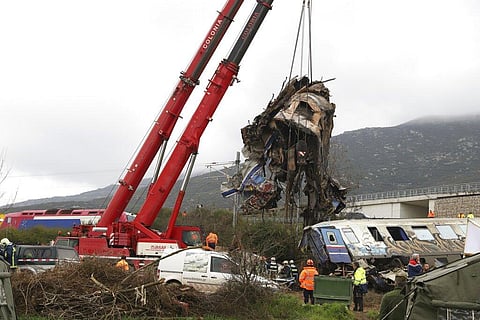Greek trains resume after deadly February rail crash: Operator
ATHENS: Intercity rail travel in Greece resumed on Wednesday for the first time since a head-on collision of two trains killed 57 people more than three weeks ago, operator Hellenic Train said.
Trains connecting shipping port Piraeus to the capital's international airport, those between Athens and Chalcis, and two other local lines in the west Peloponnese have started running again, the company said.
Traffic on the line where the crash happened on February 28, the country's worst rail disaster, will not resume until April 1, acting Transport Minister Georgios Gerapetritis said.
That line is the country's busiest, spanning 600 kilometres (370 miles) from Athens to the country's second-largest city of Thessaloniki in the north.
The train disaster sparked weeks of angry and occasionally violent protests and piled pressure on the conservative government of Prime Minister Kyriakos Mitsotakis ahead of elections due in May.
Most of the victims were university students returning from a long holiday weekend.
Greece's transport minister resigned after the disaster. The stationmaster on duty during the accident and three other railway officials have been charged and face possible life sentences.
Nevertheless, Greece's rail watchdog found in a probe that serious safety faults permeated the network, including inadequate basic training of critical staff.
On Tuesday, train drivers called for safety assurances including better monitoring of rail crossings, improved tunnel lighting, bridge inspection data and the removal of debris and overgrown vegetation from tracks.
Railway unions had long warned about problems, claiming the network was underfunded, understaffed and accident-prone after a decade of spending cuts.
The drivers' union said Tuesday that repeated warnings were "downplayed or not taken seriously."
At the demonstrations' peak, more than 65,000 people poured onto the streets demanding accountability and calling for Mitsotakis's resignation, with some accusing the government of being "murderers".
Many Greeks have been alarmed by the decay of public services in the country, which has had to privatise much of its public sector, including passenger and freight trains, to pay off debts stemming from the 2007-2008 financial crisis.

